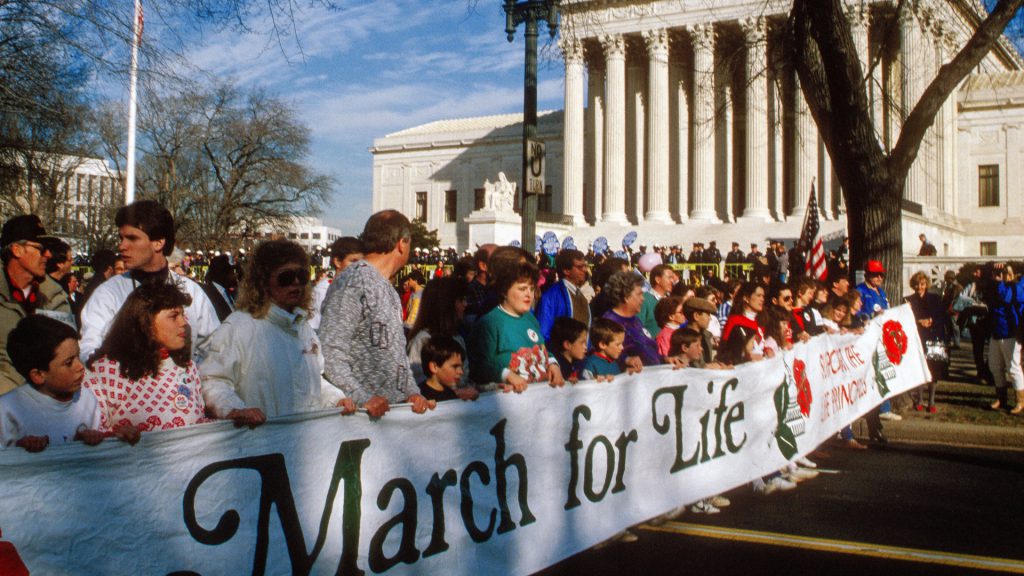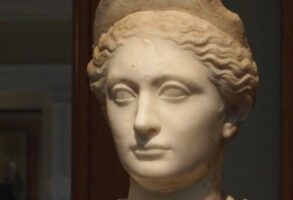
Published September 23, 2020
In the few days since Supreme Court justice Ruth Bader Ginsburg passed away, much of the media and most left-wing activists have been gearing up to prevent Donald Trump’s eventual nominee from making it onto the Court.
Many expect that his selection will be Amy Coney Barrett, a judge on the Seventh Circuit Court of Appeals, a professor at the University of Notre Dame Law School, and a Catholic mother of seven (including two children adopted from Haiti and one child with Down syndrome).
From the perspective of progressives, the reason for this line of attack is obvious. It’s the same attack that they lob against any Catholic public figure whom they suspect might actually subscribe to Church teaching on abortion — any Catholic, in other words, who actually embraces the faith they claim to profess.
The centrality of abortion in this entire schema is starkly obvious. Democratic presidential nominee Joe Biden also calls himself a Catholic, as do plenty of Democratic politicians. But like Biden, most of those Democrats have managed to rationalize away the Church’s dogmatic prohibition on the taking of innocent human life, and thus Catholicism’s non-negotiable opposition to abortion.
When was the last time you saw anyone, much less anyone on the left or in the media, insinuate that Biden will be incapable of doing his job as president because of his Catholic faith?
Barrett, meanwhile, though she hasn’t even been selected as Trump’s nominee, has already faced such attacks. When she was nominated to the Seventh Circuit in 2017, Democratic senators questioned her during the confirmation hearing about her Catholicism, insinuating that it might render her unfit to serve as a judge.
“When you read your speeches, the conclusion one draws is that the dogma lives loudly within you,” said Senator Dianne Feinstein (D., Calif.), referring to Barrett’s Catholic faith. “And that’s of concern when you come to big issues that large numbers of people have fought for for years in this country.”
Here, of course, Feinstein was hinting at the Supreme Court decision in Roe v. Wade, which Feinstein supports so dogmatically that she has called it, absurdly, a “super-precedent.” And Feinstein wasn’t the only Democrat to take issue with Barrett on account of her faith.
Democratic senator Dick Durbin criticized Barrett’s use of the term “orthodox Catholic,” arguing that it maligns Catholics who do not hold certain positions (read: the Catholic Church’s positions) about abortion. “Do you consider yourself an orthodox Catholic?” he went on to ask. Durbin himself is, like Biden, a Catholic who abandoned his previous pro-life position; one can hear in his snide remark the defensiveness of a guilty conscience.
“I think your article is very plain in your perspective about the role of religion for judges, and particularly with regard to Catholic judges,” snapped Hawaii senator Mazie Hirono later in the hearing.
As it turns out, Democrats in Barrett’s hearing were demonstrating a new trope they would roll out whenever a faithful Catholic or Christian judicial nominee came before them.
In 2018, for instance, when Brian Buescher was nominated to serve as a federal district judge in Nebraska, Senator Kamala Harris insinuated that Buescher’s involvement in the Knights of Columbus disqualified him from serving on the bench. The Knights of Columbus is a Catholic fraternal organization with more than 2 million members that has existed for over a century, primarily to conduct charitable work.
Here’s one of the questions Harris posed to Buescher about his membership in this organization:
Since 1993, you have been a member of the Knights of Columbus, an all-male society comprised primarily of Catholic men. In 2016, Carl Anderson, leader of the Knights of Columbus, described abortion as “a legal regime that has resulted in more than 40 million deaths.” Mr. Anderson went on to say that “abortion is the killing of the innocent on a massive scale.” Were you aware that the Knights of Columbus opposed a woman’s right to choose when you joined the organization?
Harris went on to ask whether Buescher was “aware that the Knights of Columbus opposed marriage equality when [he] joined the organization” and whether he had “ever, in any way, assisted with or contributed to advocacy against women’s reproductive rights.” Here, again, her concern wasn’t about Buescher’s Catholicism as such; it was about her suspicion that he actually believed what Catholics are meant to believe about abortion.
Hirono took things a bit further, asking Buescher whether he intended to “end [his] membership with this organization to avoid any appearance of bias” — in other words, suggesting that she would withhold her vote at least until he had abandoned his membership in the Knights. Left undiscussed was whether Hirono would object to his remaining a Catholic.
As I wrote at the time, it seemed clear that Democrats were using Buescher’s nomination as a test run in someday preventing Barrett from being confirmed to the Supreme Court. If media coverage is any indication, now that the moment has arrived, Barrett’s opponents are prepared to make her Catholic faith the central component in their crusade against her.
This strategy not only exposes the sinister anti-Catholic bigotry of far too many public figures, but further confirms that our judicial-nomination process is now entirely about Roe and subsequent abortion decisions.
Evidently some number of progressives are motivated in part by suspicion of — or disgust for — religious faith as such, but what really troubles them is a person of faith who opposes abortion. In other words, they’re concerned not about anyone who calls themselves Catholic, but about any Catholic who actually believes what the Church teaches about abortion, the high sacrament of the progressive creed.
And so they say, “It’s all well and good to be religious, just keep it to yourself. Your private morality doesn’t belong in the public square.”
Never mind that a person can adhere to Christian moral teaching without seeking to “impose their faith” on the rest of the country. Never mind that a person can see Roe for the anti-constitutional garbage that it is and know that abortion is killing without being religious at all. Never mind that every person, and thus every judge, regardless of their professed faith, has a “private morality” that will necessarily play a role in everything they do.
But these facts mean little to progressives, whose tenuous hold on legal, unlimited abortion is threatened each time their grip on the Court weakens. Using religious faith as a bludgeon is just the latest tactic in their real endgame: keeping judicially mandated abortion on demand in place at all costs.
Alexandra DeSanctis is a staff writer for National Review and a visiting fellow at the Ethics and Public Policy Center.








